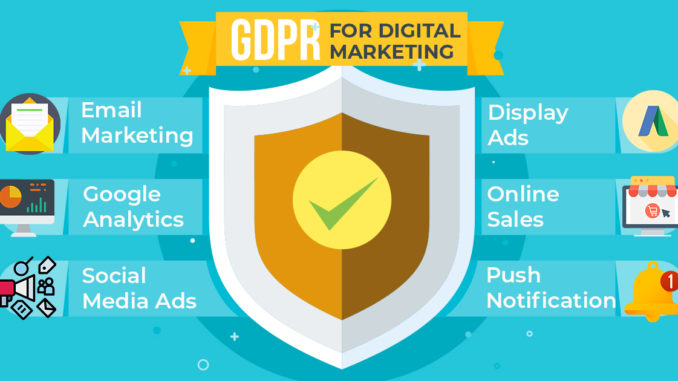
In last week, we took an in-depth look at GDPR guidelines. In this blog post, we’re going to take an in-depth look of how GDPR guidelines impact digital marketing across different channels and the benefits it might pose, overall, in the long run.
GDPR & Digital Marketing
1) Emailers – Double check your email database to see if you have anyone from the EU on there – if yes, double check if you have documented active consent from those people to be receiving emailers from you; if not, you will need to send a re-permission email, or remove them from your mailing list. Even if you don’t have anyone from the EU on your email database yet, if you feel there is a chance you might be branching out in the future, it is important to have GDPR emailer mechanisms in place, in advance. Please note buying contact lists is not going to be a viable option anymore, unless the list provider has documented consent available. Also understand that if you are using tracking pixels to see when a user is opening it, there needs to be a disclaimer about this before one subscribes. It is also advisable to do the due diligence of checking if your email service provider offers GDPR tools – for example, believe it or not, 8% of emails don’t even include something as basic as an unsubscribe link!
2) Google Analytics – You will need to anonymize data before collecting, storing and processing (i.e. IP addresses, cookies, behavior profiling), or you will need to add an overlay that warns users how you are using cookies and secure active permission from them before they enter your site.
3) Social Media Ads – If you’re running social media ads, including ads that rope in Facebook Pixel, you need to inform users and also obtain consent – for example, you can use a cookie notification bar when using Facebook pixel. Likewise, if you’re publishing sponsored content, you need to ask cross-check if pixels and cookies are being tracked – if yes, you also need also obtain consent for this at the time a user enters your site.
4) Affiliate Links – Again, you need to get consent for the usage of cookies, either on individual posts or as an overlay, before the user clicks on the affiliate ink.
5) Blog Comments – Use a checkbox to get consent from users before they leave comments on your site – this checkbox should disclose that you are storing comments and information related to the comment, including IP addresses and date(s). You’ll also need to disclose how the information is/will be used and that some of this information might be displayed publicly along with their comment.
6) PR Pitches – If you’re pitching new information to journalists who might be based in the EU, consent needs to be documented beforehand. There are some media databases that obtain consent on your behalf when creating journalist databases (i.e. PRweb, MyNewsDesk), double-check all of the fine print on the services you use before sending your next press release.
7) Display Ads – If your Website features ads from a third-party ad server, users need to immediately offer consent for this upon entering your site – they need to indicate they are okay with a third-party server being used to collect data for marketing and advertising purposes. If you are using cookies for targeting ads better, visitors need to be informed of this too, and you also need consent to be using cookies for this particular purpose.
8) Online Sales – If you are selling products / services to EU residents, again, make sure you are only collecting information that is absolutely necessary and convey this information to them at the time of check-out – consent must be obtained before they submit the purchase with a clear understanding of how information will be used.
9) Refer-A-Friend Programs – If your current users are referring their friends by entering their email IDs to collect offers, sending an automatic email to the friend’s email ID without gaining consent can be problematic. No marketing communication is to be sent out to the referee’s email address that collects and stores their personal information, until consent is formally obtained through an initial email. For more information, refer to .
10) Push Notifications – Since push notifications appear on mobile devices or desktops, you can send this to subscribers at any time because personal data is not processed (i.e. IP addresses are anonymous).
Benefits of GDPR For Digital Marketing –
Are you feeling overwhelmed as a marketer after reading all the rules and guidelines surrounding GDPR? Well, don’t feel stressed! Once you get the knack of it, you’ll realize GDPR is actually a blessing in disguise for digital marketers. The truth is, GDPR guidelines will push you to create targeted campaigns that reach out to people who are actually connected with your brand. Here are four key benefits being GDPR complaint poses –
1) Trust-Building – Being GDPR compliant showcases customers that you have their best interests in mind – it re-builds trust.
2) Improved Engagement – GDPR compliance ensures you audit your mailing list so it is more relevant – everyone on the list, when filtered down, is expressing active consent to hear from you! This is good for engagement.
3) Enhanced User Experience – Adhering to GDPR regulations actually enhances the overall digital marketing experience – consumers will be more receptive if their online experience is better.
4) Better Security – Since GDPR rules are strict regarding collecting, processing and storing personal data, fewer data breaches will happen.
We hope you’re able to look past the initial hurdles of GDPR compliance toward the many benefits it offers to improve your digital marketing campaigns to achieve better results. Do keep us updated about any difference you see in campaign performance pre and post GDPR compliance by emailing us .
